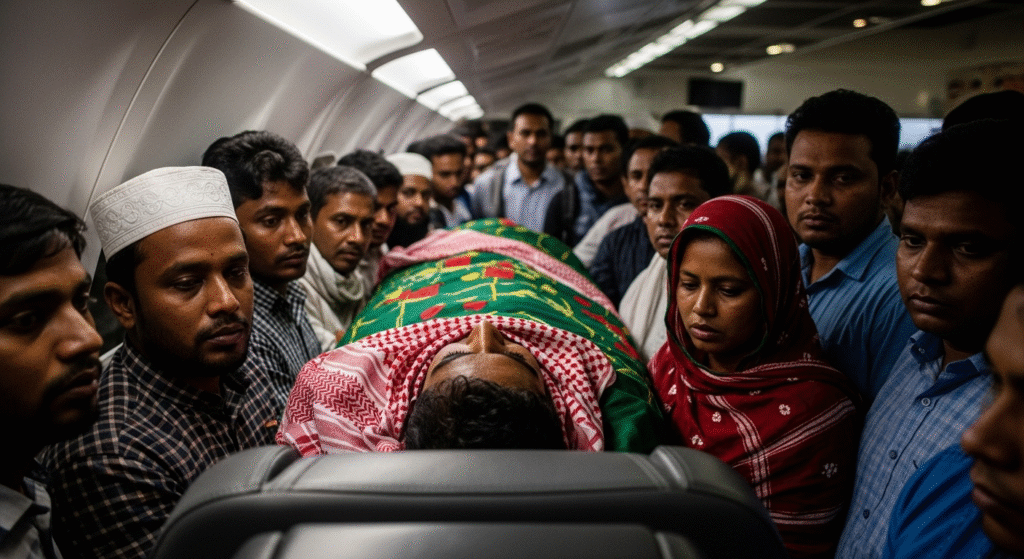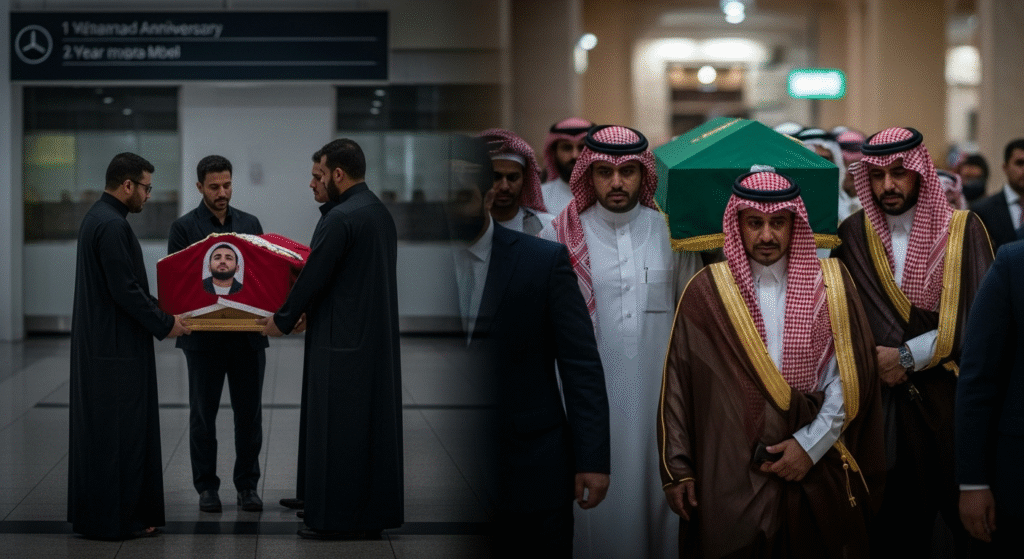Rubel’s Coffin Comes Home After a Year—His Brother and Cousin Die While Bringing Him Back

Mohammad Rubel death in saudi arabia Killed Over a Burger in Saudi: Rubel Returns in a Coffin After One Year, Only for His Brother and Cousin to Die Receiving HisBodyMohammad Rubel Ahmed, a young migrant worker from Fatikchhari in Chattogram, Bangladesh, became the victim of a tragic and shocking incident in Saudi Arabia. Over a simple act — eating a burger without his employer’s permission —
Rubel was brutally tortured by his sponsor (kafeel), leading to his untimely death. This heartbreaking Saudi Arabia death case gained further tragedy when, nearly one year later, Rubel’s body finally returned home — only for his elder brother and cousin to die in a road accident while receiving his coffin at the airport. The story of Mohammad Rubel Ahmed is a grim reminder of the struggles and neglect faced by thousands of migrant workers across the Gulf.
One Burger, Three Deaths: The Heartbreaking Journey of a Bangladeshi Migrant Worker

- 1. Identity of theexpatriate and cause of death:
Name: Mohammad Rubel (27).
Village: Talukdar Para, Bhujpur Union, Fatikchhari Upazila, Chittagong.
Country: Saudi Arabia.
Date of death: July 17, 2024 (while undergoing treatment at a hospital in Medina).
Cause of death: Rubel was brutally tortured at his workplace in Saudi Arabia for eating a burger without the permission of his employer. He died as a result of this torture.
2. Time to repatriate the body:
It took almost a year to repatriate Rubel’s body. After a long legal battle and process, his body returned to the country on July 5, 2025.
The information you mentioned, “He returned to the country in a coffin after a year” – this information is correct.
3. The next tragic incident:
While accepting and bringing Rubel’s body, his elder brother Md. Babul (37) and his cousin Osman Gani (35) died in an ambulance accident. This incident has further increased the grief over Rubel’s death.
4. The content you mentioned:
Expatriate returned to his coffin for eating burger”: This indicates the root cause of the incident, which is proven to be true by news sources.
It took a year to bring the body of a remittance fighter back to the country! This is also true and a blatant example of the delay in returning the body for expatriates.
“This video is not just a reflection of Rubel Bhai, but of the suffering and neglect of thousands of expatriates.”: Although this is an emotional comment, the long delay in returning the bodies of expatriates and the risks they face in foreign lands are actually a reflection of the experiences of many expatriates.
Hashtags:
Expatriates_sacrifice, - Rubel_want_justice, Expatriates_want_respect – these hashtags are consistent with the incident and reflect the demand for protecting the rights and dignity of expatriates.
What kind of changes are needed in the rules for expatriates:
Rubel’s incident and other such incidents raise serious questions about the rights and security of expatriates. To ensure the safety of expatriates and avoid such tragic incidents in the future, it is necessary to make changes in the following areas:
1. Ensuring speedy trial and compensation:
If an expatriate is tortured or dies abroad, a speedy trial should be initiated in the relevant country and the guilty should be punished.
Arrange for speedy compensation to be paid to the families of the workers.
2. Respectful repatriation:
Make the process of bringing the body back home simpler and faster.
Embassies should play a more active and sensitive role in this regard, so that the body is not delayed due to legal complications or bureaucratic delays.
If necessary, arrange for the rapid transportation of the body under government management or from funds.
3. Diplomatic activities and legal assistance:
Strengthen the diplomatic activities of the Bangladesh government to protect the rights of expatriates.
Ensure free or low-cost legal assistance for expatriates who are persecuted or in danger abroad.
4 Ensure transparency and accountability in the implementation of labor laws by strengthening agreements with resident countries.
Public awareness and training:
Provide detailed information and training to workers about the laws, regulations, customs and their rights of the respective country before going abroad.
Provide a clear idea of who to contact in case of any problem while working abroad.
5. Monitoring and grievance redressal:
Regularly monitor the working conditions of workers abroad and provide easy and Maintain a safe system.
Ensure speedy resolution of complaints.
6. Proper respect and recognition:
Give greater respect and recognition to remittance warriors for their contribution to the country’s economy. Give their safety and well-being the highest priority.
The Rubel incident is a symbol of the plight of the expatriates. A concerted effort by the government, concerned embassies and international organizations is essential to ensure that such incidents do not happen again.
Killed Over a Burger in Saudi: Rubel Returns in a Coffin After One Year, Only for His Brother and Cousin to Die Receiving His Body"
Legal action against Saudi sponsor and role of Saudi government
It is difficult to get any direct news or specific information about the steps taken by the Saudi sponsor (owner) in the death of expatriate Rubel.
Usually, Saudi law enforcement agencies investigate such sensitive cases. If it is truly a death due to brutal torture, then action should be taken against the accused according to Saudi labor law and criminal law.
Saudi Labor Law has some provisions to protect the rights of expatriates, including:
Safety in the workplace: Employers must ensure a safe working environment for their employees.
Repatriation of the body: According to Article 40 of the Saudi Labor Law, if an expatriate worker dies during the term of the contract, the employer must bear the cost of repatriating the body to his home country, unless the family agrees to bury it in Saudi Arabia.
Torture: Any kind of physical or mental torture is a punishable crime under Saudi law. If death occurs due to torture, it will be considered a murder case and the perpetrator may be severely punished.
However, reports by international labor rights organizations and human rights organizations often show that the trial process for crimes committed against expatriates can be
lengthy and that victims often do not receive adequate justice or compensation. In a case like
Rubel’s, since it is an allegation of death through torture, a criminal investigation is supposed to take place.
Legal action will be taken against the accused based on the results of this investigation. But at the moment, there has been no specific public announcement or news from the Saudi authorities regarding Kafil’s punishment.
Reasons for the delay in repatriating the body
It is very unfortunate that it took almost a year to repatriate
Rubel’s body, but there are several legal and bureaucratic complications behind this:
1. Investigation process: If the death is unnatural, such as torture or an accident, then the
Saudi authorities conduct a thorough investigation. This investigation involves police reports, forensic examinations, an autopsy, and the collection of evidence.
These processes can take several months or even more than a year to complete. Since it was an allegation of torture in
Rubel’s case, the investigation is naturally more complex and time-consuming.
2. Legal clearance: To repatriate the body, multiple clearances have to be obtained from various government departments in Saudi Arabia, such as:
* No Objection Certificate (NOC) from the police.
* Death certificate from the hospital.
* Forensic report.
* Exit visa (for the body) from the passport office.
* Clearance from the airport cargo office and customs.
* NOC from the Bangladesh Embassy.
Each of these steps takes a lot of time to prepare documents, obtain approvals, and coordinate.
3. Role and limitations of the embassy: In such situations, the Bangladesh embassy works to provide
legal assistance to the families of expatriates and quickly repatriate the body. However, due to Saudi Arabia’s own legal processes and bureaucratic complexities, it often becomes difficult for the embassy to work quickly. The embassy has to maintain regular contact with the
Saudi authorities and collect and submit the necessary documents on behalf of the family.
4. Cooperation of the sponsor: According to labor law, the sponsor is supposed to bear the cost of repatriating the body.
But in many cases, the sponsor or employer is uncooperative or does not want to get involved in legal troubles, which further delays the process.
If there is non-cooperation from the sponsor, the embassy has to resolve the matter through legal processes, which takes time.
5. Family decisions and documents: Sometimes the family of the deceased may delay in making decisions about the burial of the body or sending the necessary documents, such as a
Power of Attorney. Although this is a rare reason, in some cases it can also be a cause of delay.
Overall, the main reason for the delay in Rubel’s case is the need for a detailed and thorough investigation due to the unnatural death and the complex legal and administrative processes in Saudi Arabia.
Necessary changes for expatriates
The changes you have mentioned are very timely and important to ensure that tragic incidents like Rubel do not happen again. In particular:
Speedy trial and compensation: It is very important to ensure speedy trial in cases of torture of expatriates abroad and to provide compensation to the families.
Speedy repatriation of bodies: The process of repatriating bodies to the country needs to be made simpler, more transparent and faster. Embassies should play a more active and sensitive role.
Diplomatic outreach and legal assistance: It is essential to strengthen the diplomatic outreach of the Bangladesh government and ensure free legal assistance for expatriates abroad.
Public awareness and training: Workers should be provided with detailed training on laws, regulations, customs and rights before going abroad.
Monitoring and grievance redressal: Regular monitoring of the working environment and reporting of complaints
Uncounted Lives: Thousands of Non-Saudi Deaths in Saudi Arabia from 2000 to 2025 — A Hidden Crisis
From 2000 to 2025, the true number of non-Saudi citizen deaths in
Saudi Arabia remains unknown—a reflection of deeper issues tied to transparency, labor rights, and systemic neglect. While official data is scarce or withheld, various human rights reports and embassy records estimate thousands of migrant workers—mainly from India, Nepal, and Bangladesh—have died,
often under conditions linked to workplace hazards, extreme heat, or negligence.
Between 2017 and 2025 alone, an estimated 21,000 deaths have occurred, largely associated with mega-projects under
Saudi Arabia’s Vision 2030, such as NEOM. Many of these deaths are routinely classified as “natural causes”,
sparking global concern over misreporting, undercounting, and the true nature of the risks faced by migrant laborers in the Kingdom. This article explores the available data, controversy, and human cost behind the hidden death toll of Saudi Arabia’s migrant workforce.
Deaths of non-Saudi citizens in Saudi Arabia (2000–2025).
No accurate public data: There is no accurate, publicly available total figure for deaths of non-Saudi citizens in Saudi Arabia from 2000 to 2025. However, research suggests the number is likely to be in the thousands, particularly due to workplace accidents and health problems.
Vision 2030-linked deaths: Reports indicate that approximately 21,000 migrant workers have died from 2017 to 2025, mainly
linked to Vision 2030 projects such as NEOM. Many of these workers were from India, Nepal and Bangladesh.
Data before 2017 is scarce:
Comprehensive data before 2017 is scarce, but evidence suggests that a large number of deaths occurred even then, often misclassified as “natural causes,” hiding the true risks of the workplace.
Controversy and lack of transparency: Claims of these high death tolls have been labelled “misinformation” by Saudi officials, while human rights groups emphasise systemic issues and a lack of transparency.
Overview
The question about the number of non-Saudi nationals who died in Saudi Arabia from 2000 to 2025 is complex, as public data is limited and reports vary.
While exact figures are unavailable, we can understand the gravity of the situation by combining estimates from records of human rights organisations and embassies.
Significant migration for work occurred during this period, especially in the construction sector, leading to both documented and undocumented deaths.
Available estimates
From 2017 to 2025, the Walk Free Foundation has estimated that around 21,000 migrant worker deaths occurred, mainly
linked to large projects such as NEOM, which involved over 14,000 Indian workers. For the years before 2017 (2000-2017), specific total figures are hard to find, but reports suggest there were thousands of deaths, often underreported or misclassified.
Challenges and context
Many deaths are recorded as “natural causes,” which human rights groups argue may mask workplace accidents or heat-related issues.
For example, 1,420 Indian worker deaths in 2023, 74% of which were listed as “natural causes,” and 887 Bangladeshi workers in early 2024 were similarly classified.
Survey Note: Detailed Analysis of Non-Saudi Citizen Deaths in Saudi Arabia (2000-2025)
This section provides a comprehensive overview of the available data, estimates, and challenges relating to deaths of non-Saudi (foreign/migrant) citizens in Saudi Arabia over the 25-year period from 2000 to 2025.
It is based on reports from human rights organizations, embassy records, and media investigations, acknowledging the lack of a centralized, publicly available total figure.
Background and Data Availability
The absence of a centralized “total list” or accurate figure for non-Saudi citizen deaths from 2000 to 2025 is a significant obstacle.
Saudi Arabia does not publicly release detailed mortality data by nationality, and causes of death are often kept classified, limiting transparency.
This lack of data is exacerbated by privacy concerns and the lack of comprehensive investigation of migrant worker deaths, as noted in several reports.
Specific estimates and reports
While an exact total figure is unavailable, several reports provide insight into the scale of deaths, especially in recent years:
2017-2025 period (Vision 2030 and NEOM projects):
A January 2025 report from the Walk Free Foundation, highlighted in the documentary “Kingdom Uncovered:
Inside Saudi Arabia”, estimated that approximately 21,000 migrant workers have died in the last 8 years (roughly 2017-2025) since the start of NEOM and other Vision 2030 projects.
This means more than 8 deaths per day, with the majority coming from Nepal, India and Bangladesh. Specifically, more than 14,000 Indian workers have lost their lives.
This estimate is controversial, as the Saudi government, through the National Council for Occupational Safety and Health, has labeled such claims “misinformation”, stating that the work-related fatality rate is 1.12 per 100,000 workers, which places Saudi Arabia among countries with low rates.
However, human rights groups dispute this, citing a lack of transparency. Specific nationality data (recent years):
A May 2025 report by Human Rights Watch details specific cases, including:
In 2023, the Indian embassy in Riyadh recorded the deaths of 1,420 Indian migrant workers, of which 74% were classified as “natural causes”.
In the first 6 months of 2024, 887 Bangladeshi workers died, of which 80% were also classified as “natural causes”.
From 2019 to 2022, 870 Nepali workers died, with 68% listed as “natural causes.”
These figures are partial, as many deaths may not be recorded by embassies, especially if families do not report or bodies are not repatriated.
Data before 2017 (2000-2016):
Data before 2017
In a tragic example of the dangers faced by migrant workers, Mohammad Rubel Ahmed, a 27-year-old Bangladeshi from Fatikchhari, Chattogram, lost his life in Saudi Arabia after being brutally tortured—reportedly over a disagreement involving a burger. His body returned home almost a year later, but fate struck again when his elder brother and cousin died in a road accident while receiving the coffin at the airport. The heartbreak didn’t end with Rubel’s death—it exposed a systemic crisis affecting thousands of migrant workers whose stories rarely make headlines.
As we reflect on this devastating incident, it becomes clear how crucial it is to create safe, local employment alternatives for Bangladesh’s youth. One such initiative, the Manik Computer Training Center in Ghior, Manikganj, is empowering young people with digital skills to pursue careers at home—without risking their lives abroad.
The tragic death of Mohammad Rubel Ahmed, a 27‑year‑old Bangladeshi migrant in Saudi Arabia, is not an isolated incident—it’s part of a much broader issue of systemic neglect, silence, and the failure to protect the vulnerable. Whether it’s the ignored cries of a young girl in rural India who died during her first period, or a migrant worker tortured over a burger, these stories highlight the urgent need for awareness, accountability, and dignity for all.
Read more about how silence around menstruation cost a teenage girl her life in rural India, and how we must challenge the taboos and failures that continue to end lives before they even begin.




Pingback: Umma Kulsum Popi Biography the first female agri influencer
Pingback: Saudi Arabia's 'Sleeping Prince' really woken up from a 20